 Sleep apnea affects more than your sleep quality. It can seriously impact your teeth and gums. Conditions like bruxism, enamel wear, and dry mouth are common in patients with sleep apnea, increasing the risk of cavities and oral infections. Your dentist can help you protect your oral health while addressing sleep apnea.
Sleep apnea affects more than your sleep quality. It can seriously impact your teeth and gums. Conditions like bruxism, enamel wear, and dry mouth are common in patients with sleep apnea, increasing the risk of cavities and oral infections. Your dentist can help you protect your oral health while addressing sleep apnea.
Dry Mouth
Sleep apnea is commonly associated with sleeping with an open mouth. People often breathe through their mouths, which results in dry mouth from the increased air flow. A dry mouth during sleep increases the risk of cavities and gum disease. Saliva helps to neutralize acid and fight bacteria through a natural cleansing action. Without it, acid and bacteria are free to build on the teeth. Mouth dryness and bacteria buildup can also result in inflamed gums. If not addressed, gum dryness can create long-term damage. Dry mouth can also create an increased risk of oral infection from the increased amount of bacteria.
Teeth Grinding and Clenching
It’s common for people with sleep apnea to grind their teeth or clench their jaw. Both of these actions create excess wear and tear on the teeth. Over time, the enamel wears and cracks can form. These weaken the structural strength of the teeth and make them more sensitive. This can lead to experiencing pain or pressure from hot or cold foods and drinks.
TMJ Disorder
Many sleep apnea sufferers also experience the symptoms of TMJ. This can include jaw stress from grinding or clenching at night. The misalignment of the jaw joint can lead to discomfort during the day. Common symptoms experienced include headaches and stiffness. Many people find themselves changing how they speak and chew to accommodate the discomfort.
Oral Sores or Irritation
Dry mouth and nighttime clenching can cause injuries to the inside of the mouth. These injuries may seem minor, but they can lead to much larger issues in people who have sleep apnea. Lack of restful sleep reduces the immune system’s ability to function. Without a strong immune system, the body struggles to heal itself. This poor healing ability makes dealing with injuries or dental procedures more difficult.
Sleep Apnea
Sleep apnea may seem like a sleep problem, but its consequences reach your teeth and gums as well. Dry mouth, enamel erosion, and jaw discomfort are just a few of the risks. By working closely with your dentist, you can manage sleep apnea while maintaining a healthy, confident smile.
Protect your smile and your sleep. Schedule a comprehensive dental evaluation.
